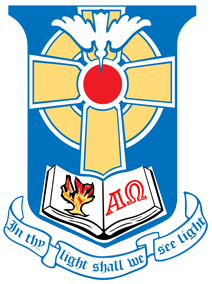
Presbyterianism is a Reformed (Calvinist) Protestant tradition named for its form of church government by representative assemblies of elders. Though there are other Reformed churches that are structurally similar, the word Presbyterian is applied to churches that trace their roots to the Church of Scotland or to English Dissenter groups that formed during the English Civil War.

The Presbyterian Church (USA), abbreviated PCUSA, is a mainline Protestant denomination in the United States. It is the largest Presbyterian denomination in the country, known for its liberal stance on doctrine and its ordaining of women and members of the LGBT community as elders and ministers. The Presbyterian Church (USA) was established with the 1983 merger of the Presbyterian Church in the United States, whose churches were located in the Southern and border states, with the United Presbyterian Church in the United States of America, whose congregations could be found in every state.

The Church of Scotland is the national church in Scotland, and still one of the country's largest, with 270,000 members in 2022. According to the government Scottish Household Survey in 2019, 20% of the Scottish population identified the Church of Scotland as their religious identity. The Church of Scotland's governing system is presbyterian in its approach, therefore, no one individual or group within the church has more or less influence over church matters. There is no one person who acts as the head of faith, as the church believes that role is the "Lord God's". As a proper noun, the Kirk is an informal name for the Church of Scotland used in the media and by the church itself.

The Presbyterian Church in America (PCA) is the second-largest Presbyterian church body, behind the Presbyterian Church (USA), and the largest conservative Calvinist denomination in the United States. The PCA is Reformed in theology and presbyterian in government.

The Westminster Confession of Faith, or simply the Westminster Confession, is a Reformed confession of faith. Drawn up by the 1646 Westminster Assembly as part of the Westminster Standards to be a confession of the Church of England, it became and remains the "subordinate standard" of doctrine in the Church of Scotland and has been influential within Presbyterian churches worldwide.

The Free Church of Scotland is a Scottish denomination which was formed in 1843 by a large withdrawal from the established Church of Scotland in a schism known as the Disruption of 1843. In 1900, the vast majority of the Free Church of Scotland joined with the United Presbyterian Church of Scotland to form the United Free Church of Scotland. In 1904, the House of Lords judged that the constitutional minority that did not enter the 1900 union were entitled to the whole of the church's patrimony, the Free Church of Scotland acquiesced in the division of those assets, between itself and those who had entered the union, by a Royal Commission in 1905. Despite the late founding date, Free Church of Scotland leadership claims an unbroken succession of leaders going all the way back to the Apostles.

The Associate Reformed Presbyterian Church (ARPC) is a theologically conservative denomination in North America.The ARPC was formed by the merger of the Associate Presbytery (seceder) with the Reformed Presbytery (covenanter) in 1782. It is one of the oldest conservative denominations in the United States.

The Westminster Assembly of Divines was a council of divines (theologians) and members of the English Parliament appointed from 1643 to 1653 to restructure the Church of England. Several Scots also attended, and the Assembly's work was adopted by the Church of Scotland. As many as 121 ministers were called to the Assembly, with nineteen others added later to replace those who did not attend or could no longer attend. It produced a new Form of Church Government, a Confession of Faith or statement of belief, two catechisms or manuals for religious instruction, and a liturgical manual, the Directory for Public Worship, for the Churches of England and Scotland. The Confession and catechisms were adopted as doctrinal standards in the Church of Scotland and other Presbyterian churches, where they remain normative. Amended versions of the Confession were also adopted in Congregational and Baptist churches in England and New England in the seventeenth and eighteenth centuries. The Confession became influential throughout the English-speaking world, but especially in American Protestant theology.

The Presbyterian Church in the United States of America (PCUSA) was a Presbyterian denomination existing from 1789 to 1958. In that year, the PCUSA merged with the United Presbyterian Church of North America. The new church was named the United Presbyterian Church in the United States of America. It was a predecessor to the contemporary Presbyterian Church (USA).

The Presbyterian Reformed Church (PRC) is a North American Christian denomination which was founded in Ontario, Canada on November 17, 1965, when two existing congregations, with similar Scottish Presbyterian roots, came together under a Basis of Union drafted by Prof. John Murray of Westminster Theological Seminary, Philadelphia, PA.

The Westminster Standards is a collective name for the documents drawn up by the Westminster Assembly (1643–1649). These include the Westminster Confession of Faith, the Westminster Shorter Catechism, the Westminster Larger Catechism, the Directory of Public Worship, and the Form of Church Government, and represent the doctrine and church polity of 17th century English and Scottish Presbyterianism. The Westminster Confession of Faith and Larger and Shorter Catechism have been adopted as doctrinal standards by a number of Reformed and Presbyterian Christian denominations, but not the Church of Scotland nor those derived directly from it.

The Directory for Public Worship is a liturgical manual produced by the Westminster Assembly in 1644 to replace the Book of Common Prayer. Approved by the Parliament of England in 1644 and the Parliament of Scotland in 1645, the Directory is part of the Westminster Standards, together with the Westminster Confession of Faith, the Westminster Shorter Catechism, the Westminster Larger Catechism, and the Form of Church Government.
There have been several liturgical books used in the Presbyterian Church (USA). Presently, the primary liturgical book of the Presbyterian Church (USA) is The Book of Common Worship of 1993, published in cooperation with the Cumberland Presbyterian Church.

Jennings Ligon Duncan III is an American Presbyterian scholar and pastor. He is Chancellor of Reformed Theological Seminary.
Presbyterian worship documents worship practices in Presbyterian churches; in this case, the practices of the many churches descended from the Scottish Presbyterian church at the time of the Reformation.

The Old School–New School controversy was a schism of the Presbyterian Church in the United States of America which took place in 1837 and lasted for over 20 years. The Old School, led by Charles Hodge of Princeton Theological Seminary, was more conservative theologically and did not support the revival movement. It called for traditional Calvinist orthodoxy as outlined in the Westminster standards.

The Presbyterian Church of Brazil is an Evangelical Protestant Christian denomination in Brazil. It is the largest Presbyterian denomination in the country, having an estimate 702,949 members, 4,915 ordained ministers and 5,420 churches and parishes. It is also the only Presbyterian denomination in Brazil present in all 26 States and the Federal District.
The Presbyterian Church in the Republic of Korea or the KiJang Presbyterian Church is an ecumenically-minded Presbyterian denomination in South Korea.
The Presbyterian Church of the Philippines (PCP), officially The General Assembly of the Presbyterian Church of the Philippines, is a growing evangelical, Bible-based Reformed church in the Philippines. It was officially founded in 1987 and the General Assembly was organized in September 1996.
The Kosin Presbyterian Church in Korea, also called Korea-pa, is an Evangelical Reformed and Presbyterian denomination in the Republic of South Korea. Although, congregations have spread all over North America and in many other countries.














